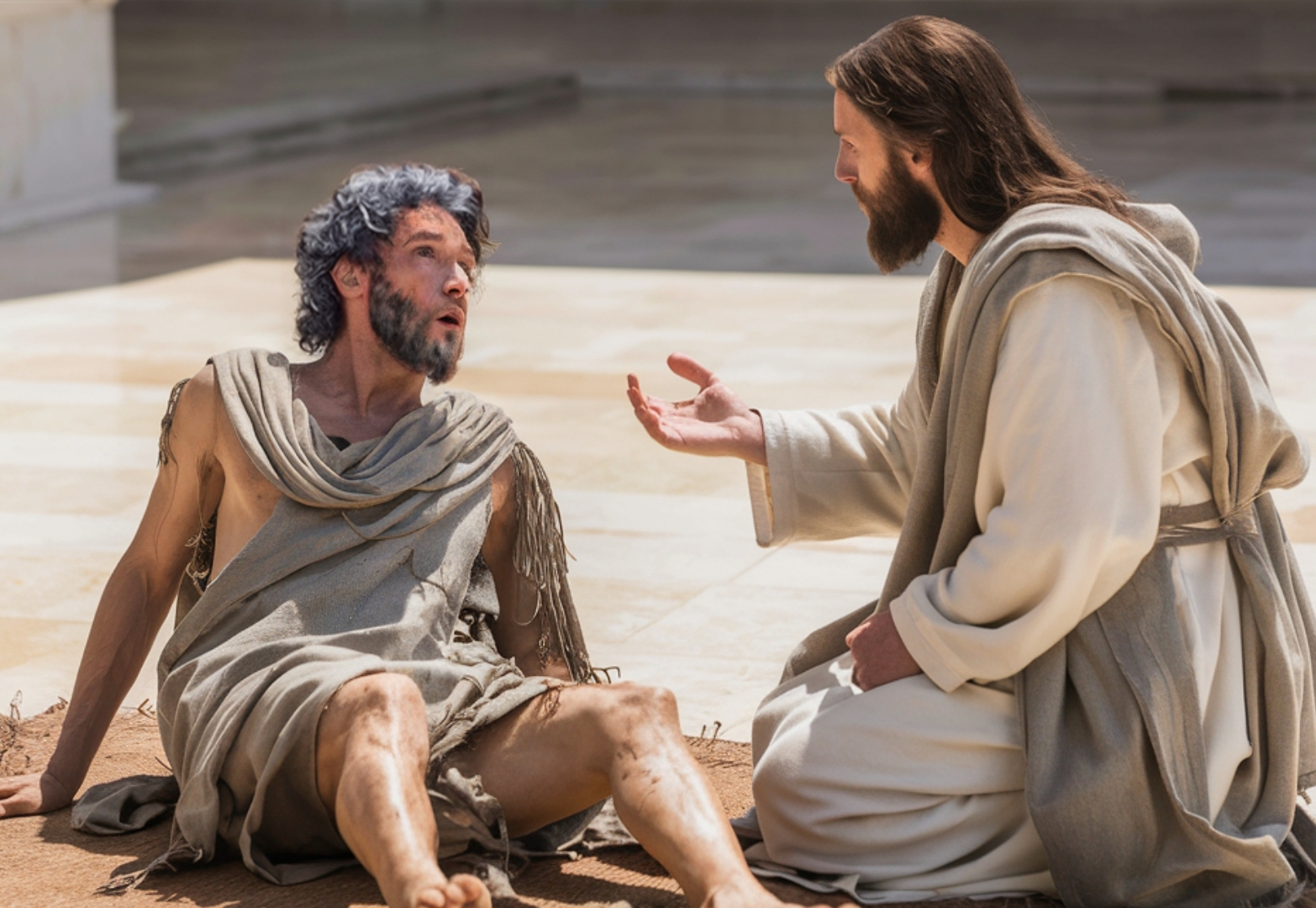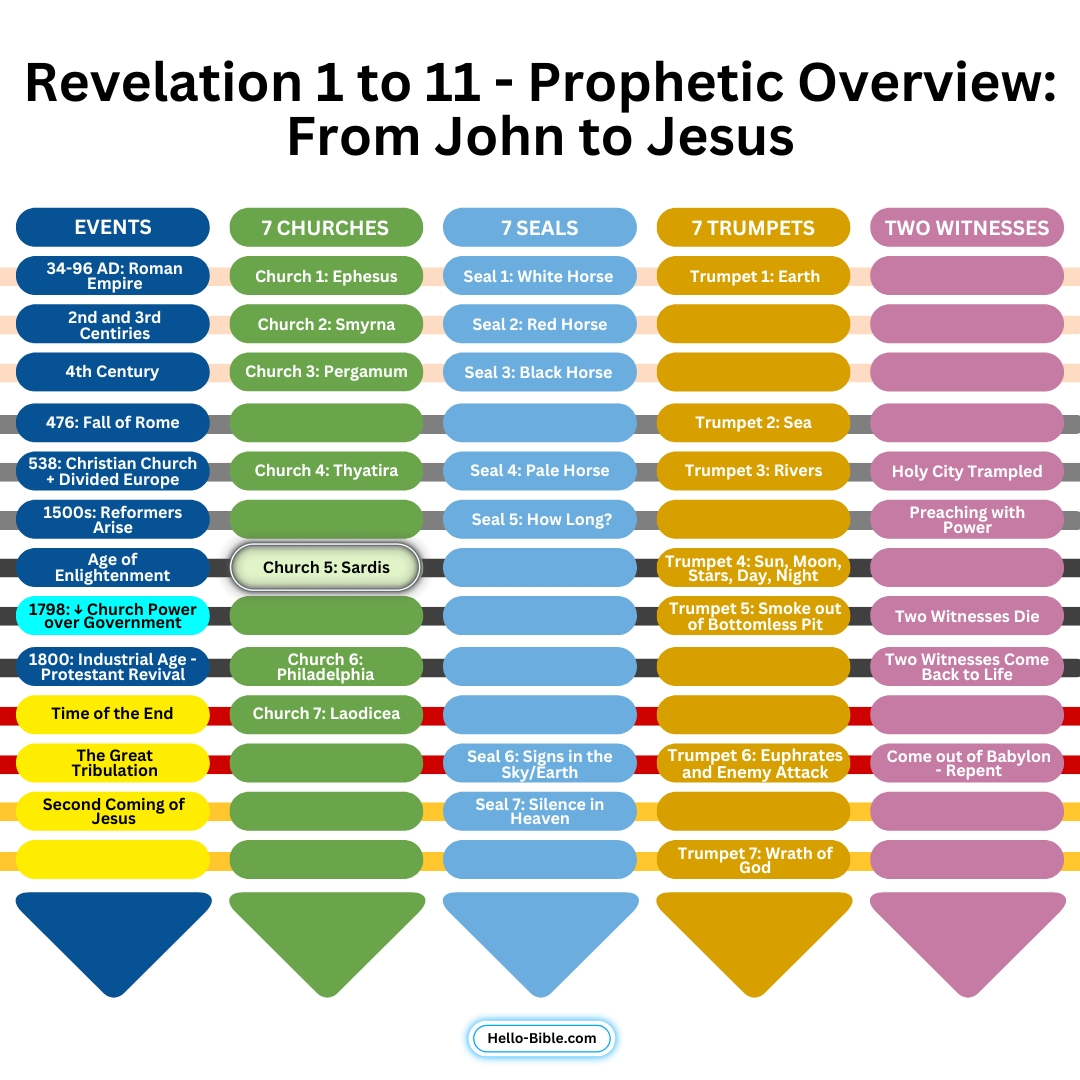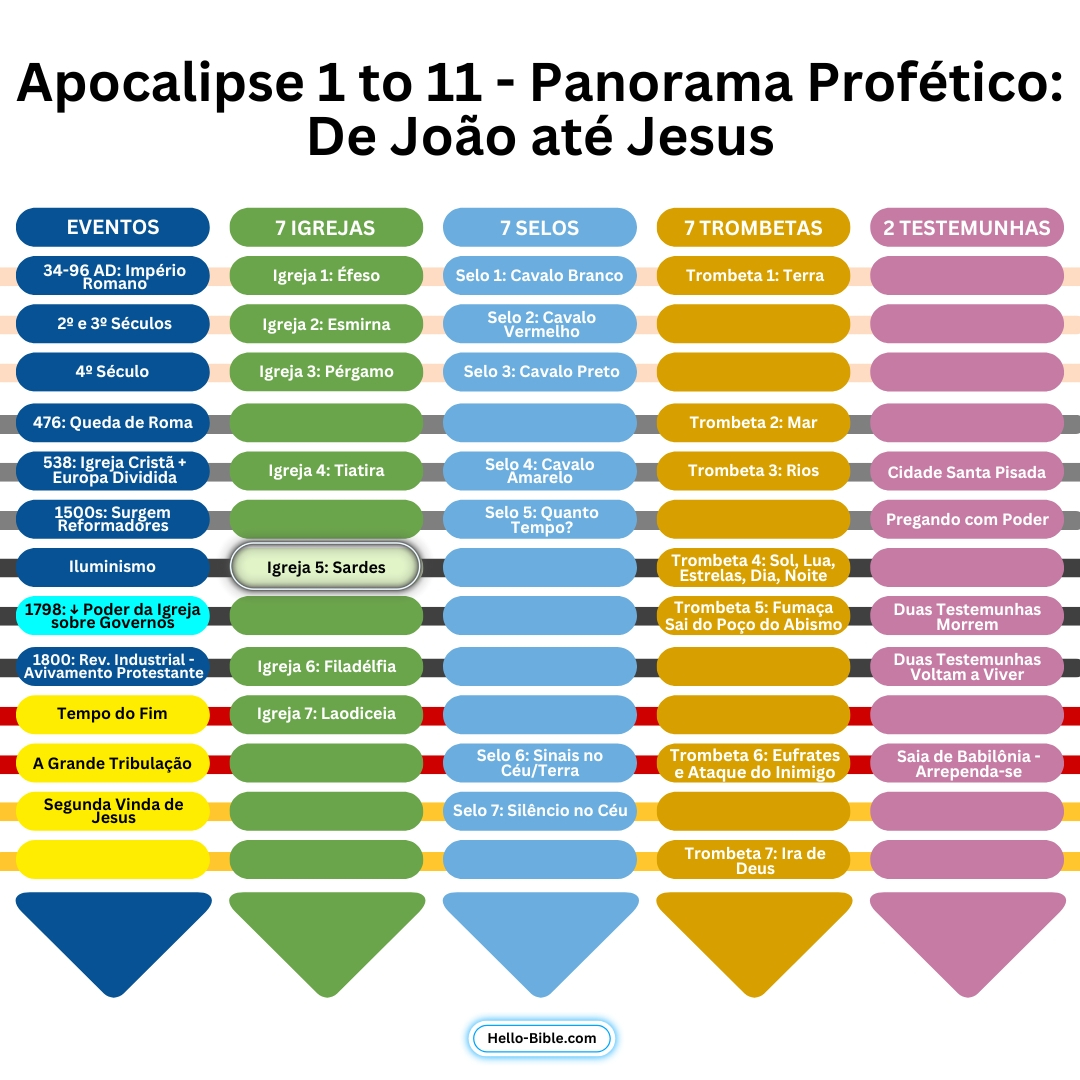1 And unto the angel of the church in Sardis write; These things says he that has the seven Spirits of God, and the seven stars; I know your works, that you have a name that you live, and are dead.
2 Be watchful, and strengthen the things which remain, that are ready to die: for I have not found your works perfect before God.
3 Remember therefore how you have received and heard, and hold fast, and repent. If therefore you will not watch, I will come on you as a thief, and you will not know what hour I will come upon you.
4 You have a few names even in Sardis who have not defiled their garments; and they shall walk with me in white: for they are worthy.
5 He that overcomes, the same shall be clothed in white clothing; and I will not blot out his name out of the book of life, but I will confess his name before my Father, and before his angels.
6 He that has an ear, let him hear what the Spirit says unto the churches.
Drawing Connections
In Part 1 of our study on the church in Sardis, we saw that the city and the church could be described pretty much in the same way. The members of the church looked like they were alive, but they were afflicted by a spiritual disease that had them dead or at their death beds. They were at risk of experiencing eternal death if they did not repent and wake up. Today, in Part 2, we will go over the formatted letter and see how Christians can overcome this sad spiritual morbidity condition. We will also cover the prophetic application of this message.
Part 1 Part 2
Part 2
Closer Look
*** Recipient -> “To the Angel of the Church in Smyrna” ***: Once again, the letter is addressed to the leader of the church, but applicable to all the members. Please see the comments in study #9, #12, and #14.
*** Sender -> “He who has the seven spirits of God and the seven stars” ***: Like in Ephesus, Jesus comes to the church in Sardis as the one who holds the seven stars. The seven stars are the leaders of the church (Revelation 1:20; please see also lessons #9 and #14). Jesus knows them, and cares for them. Jesus also says He has the seven spirits of God. In other words, He has the cure for their problem: the Holy Spirit (see lesson #5).
*** Assessment -> “I know…” ***: Jesus has complete knowledge of all the issues in the church. Nothing good is said about it. It needs to work on everything:
- Problem: The first thing we read about it is alarming. Jesus said the church had a name, but it was actually dead. The word “name” was translated from the Greek onoma, which means: name, character, fame, reputation. Jesus is saying that Sardis is quite literally just a name. It has no meaning. The church was dead, being carried forward in time by the fame of a previous era. It had a reputation but a stagnant substance. The church looked like it was alive, with all of the works that would be expected from a live and Spirit filled congregation. But the reality was, it was spiritually dead.
- Works: It had works. But it was the type of work God considers insufficient. It seems that the ones doing the works were those who were about to die, but had not completely passed away just yet. As we saw in lesson #21, the work that God requires is this: "to believe in the one he has sent” (John 6:29). If the members were not presenting works that measured up to God’s standards, it’s because they were not really believing in the One He had sent, or at least not wholeheartedly. If their beliefs were not based solely on God’s teachings, then it means that they were based on human traditions instead. They had become empty rituals. Their beliefs were incomplete, not perfect. Having just part of the truth that has been revealed already was not good enough in God’s eyes.
- Warning: Just as one of the possible meanings of the word Sardis, the few remaining ones (see study #22), those who escaped from spiritual death, were not out of danger either. Verse 2 says they are about to die. Jesus is calling the dead leader to wake up and do something for the dying congregation.
*** Appeal -> “Remember, keep, and repent, or else” ***: Jesus explained how the church can turn around and come back to life. The appeal is very similar to the one given to the church in Ephesus (Revelation 2:5). Ephesus displayed the initial symptoms of this spiritual disease. The illness had already run its full course in Sardis. The members were dying, even though they had the antidote with them all along. Jesus was telling them to remember the true message they had received. They were being called to keep that message in mind, and not move away from it. But Jesus didn't stop there. They had to keep it. They had to act according to that message. Simply knowing it was not enough. They had to do something about it.
This call reminds us of what Jesus said to the paralyzed man in Capernaum, and the one in Bethesda (Mark 2:1-12; John 5:1-15): “Get up, pick up your mat and walk”. He didn't just declare the men healed, and expected them to remain lying down on the ground, just as they had been for years. Jesus told the men to get up. How different would their life be from before if they had not gotten up? Paralyzed and lying on the ground versus cured and still lying on the ground? When Jesus resurrected Lazarus from the dead, He didn't expect His friend to remain in the tomb. Jesus called him out of the tomb. “Lazarus, come forth!” (John 11:43). In order to remain spiritually revived, we cannot continue to do the same things we were doing (or not doing) before we were restored. The key to understanding how it would be possible to raise Sardis from the dead, and get it to stand up again, comes at the end of the phrase: repent. Jesus was telling the church then, and us today, that we need to recognize our faults, and our dependence on God. We see this same forgiving attitude from Jesus in the stories of the paralyzed men: “See, you are well again. Stop sinning or something worse may happen to you.” (John 5:14). “Son, your sins are forgiven.” (Mark 2:5).
Do you want to get well?

“Get up, pick up your mat and walk” (John 5:8)
© Hello-Bible - 2024
The appeal to Sardis comes with a serious warning. If the church doesn't wake up, return to God, and practice the truth, Jesus will come to it as a thief in the night. There are two very important elements in this warning:
- This warning is said to the church members. Jesus will return unexpectedly, as a thief, to people who call themselves Christians. Jesus is not addressing the non-believers here.
- His coming will only be unexpected to those not practicing the complete message in the Word of God - those who are not keeping watch (Matthew 24:42-44; Mark 13:35-37). But how do we know we have the complete Word? How can an imperfect human being have all of the truth? The answer is in the beginning of verse 3. We are expected to practice the truth according to what we received and heard. But, the more we walk with God, the more we receive and hear. Learning God's truth is not a static experience. The level of responsibility for our actions increases the more we learn. Choosing to remain in a comfortable level of ignorance, is not going to keep us from being caught by surprise when Jesus comes. The end of verse 3 says that to the ones who chose not to live His message, He will come against them, for judgement and destruction. But to the ones who choose to truly follow Him, He will come for them, and will take them to the Kingdom of God (Matthew 13:36-43; 1 Thessalonians 5:9).
The coming as a thief is a reminder of how the city of Sardis had been conquered before. The soldiers were so confident, that they were not keeping watch as they should. 1 Thessalonians 5:2-4 says: "for you know very well that the day of the Lord will come like a thief in the night. While people are saying, “Peace and safety,” destruction will come on them suddenly, as labor pains on a pregnant woman, and they will not escape. But you, brothers and sisters, are not in darkness so that this day should surprise you like a thief." Now it is even more clear that Jesus' coming as a thief will only happen to those not keeping watch. The ones in the light will not be surprised, and His coming will not be like a thief. They will be expecting His arrival. The day He comes as a thief, the Earth will be completely destroyed, so He is giving us a chance now to repent (2 Peter 3:9-10). There will be no more chances after He comes as a thief. "Since everything will be destroyed in this way, what kind of people ought you to be? You ought to live holy and godly lives as you look forward to the day of God and speed its coming. That day will bring about the destruction of the heavens by fire, and the elements will melt in the heat. But in keeping with his promise we are looking forward to a new heaven and a new earth, where righteousness dwells." (2 Peter 3:11-13).
Jesus concludes His appeal with a promise to a special group in Sardis. A few members have not been contaminated by the germs of the spiritual disease that had spread throughout the church. They not only had not soiled their garments with pagan influences, but also still had names that meant something. These names were alive, and were worthy to walk with Jesus. They were wearing a special white garment of victory. The Christians back then were familiar with the concept of wearing white for a special occasion. The Romans would wear white to celebrate a war victory. At the end of time, the remnant of God will be the ones wearing white. This moment is described in Revelation 7:9-17, and Revelation 19:7-8.
*** Call to hear the Spirit -> The Spirit says to the churches ***: The message of “remember and keep the truth, and repent” was to be heard by all churches. There are no excuses not to hear this call. Please see the notes on study #14. Jesus is calling the church to be vigilant and diligent. Knowing and living His truth is literally a matter of life and death.
*** Promise -> To the one who overcomes ***: The one who overcomes receives several promises:
- White garments: God has been clothing human beings since Creation. Adam and Eve lost their original robes of glory, and found themselves naked after sin. They quickly went on to make some coverings out of fig leaves (Genesis 3:7). The original in Hebrew says they made aprons (ḥă·ḡō·rōṯ) out of the leaves. That certainly did not provide enough coverage, and the leaves would definitely not last very long. So God made new garments of skin, and clothed them (Genesis 3:21). Even though that was also a temporary outfit, it gave them full coverage. God designed the robes the priests were to wear in the service of the temple (Exodus 28). God is also the one who gives the white garments to the saved (Revelation 6:11). Isaiah described this robe that God gives to His people: “I delight greatly in the Lord; my soul rejoices in my God. For he has clothed me with garments of salvation and arrayed me in a robe of his righteousness, as a bridegroom adorns his head like a priest, and as a bride adorns herself with her jewels.”(Isaiah 61:10). The sacrifice of Jesus is what covers the sinner completely, transforming the overcomer into a blameless new creature. Just like when He resurrected Lazarus from the dead, Jesus wants to remove our filthy grave clothes (John 11:44), and dress us up in a pure robe of righteousness.
- Name on the book of Life: Jesus promised He will not erase the name of the overcomer from the Book of Life. The overcomer has a name, and a name that matters. A name worthy enough to remain in the most important book in the universe. Only the ones with their names found in this book will enter the Kingdom of God (Revelation 21:27). The Bible tells us that names can be blotted out of this book: “The Lord replied to Moses, “Whoever has sinned against me I will blot out of my book.”(Exodus 32:33). Psalm 69:28 also talks about the unrighteous being blotted out of this book. Both passages referred to the Old Testament church. And this remains true for the New Testament church as well. The blotting out of the name means eternal death (Revelation 20:15). Being part of a church, or going through baptism, does not guarantee a name in God’s book. Unless we wake up, keep watch, and live the way God wants us to live, we will not be able to enter the Kingdom. Jesus said in Matthew 7:21-23: “Not everyone who says to me, ‘Lord, Lord,’ will enter the kingdom of heaven, but only the one who does the will of my Father who is in heaven. Many will say to me on that day, ‘Lord, Lord, did we not prophesy in your name and in your name drive out demons and in your name perform many miracles?’ Then I will tell them plainly, ‘I never knew you. Away from me, you evildoers!’” Jesus says He never knew them, because they never knew Him. They never really wanted to keep walking in Him (Colossians 2:6; 1 Thessalonians 4:1)
- Name confessed: This is a two-part promise. Jesus will confess the name of the overcomer to the Father. Jesus will also confess the name of the overcomer to His angels. The word ‘confess’ is translated from the Greek homologēsō, which means: to promise, agree, confess, publicly declare, praise, celebrate. This is not the first time Jesus promises to confess the names of His faithful people before the Father and His angels. We read these promises in Matthew 10:32-33 and Luke 12:8-9. Christ will make a public announcement, celebrating all of those who wholeheartedly confessed His name before the world.
*** Church history view and prophetic application ***: The prophetic view of this church fits the period between the 16th and 17th centuries, which is the time that came after the Reformers had woken up the church. The Reformers had brought awareness to the differences between what the Bible was actually teaching, and what the established church was preaching. A number of Protestant churches came out of this movement. But after the Reformers passed away, the following generations became focused on doctrinal debates and controversies and fell into the same error the Reformers had fought so hard to move away from: formalism. This church seemed to be alive, but it was not. It had works, but they were not works that reflected the never ceasing learning process started by the original Reformers. Towards the end of this period, it was then easy for the emerging philosophies of rationalism and secularism to permeate the church. This further affected the lifeless condition of the church.

© Hello-Bible - 2024

© Hello-Bible - 2024
Overview
The church in Sardis thought it had all the truth it needed. The congregation was sustained by the fame it once had. But Sardis had nothing behind its name anymore. No anchors were deeply rooting it in the Word of God. The members were going on, partially following the Scripture. So, Jesus called them to remember His message. Christ calls His children to follow Him completely, not just partially. Unlike Lazarus, Sardis had made the choice to remain in the tomb. The members did not want to get up and get off the mat where they were lying. They were not walking with Christ as they should have. The letter to Sardis brings such a powerful message. Are we so comfortable with the initial knowledge we received, that we think we have a complete outfit of the Gospel, when in reality, we are walking around with an apron of fig leaves? Jesus is saying it is time to get up, and come forth, out of the grave! It is time to put on the complete robe of righteousness, and walk with Christ. Walking with Him, and confessing His name is how we get to know Jesus. As Christ said in Matthew 7:21-23, only the ones He knows will enter the kingdom of Heaven. In the words of Jesus: “[..] I am the resurrection and the life. The one who believes in me will live, even though they die; and whoever lives by believing in me will never die. Do you believe this?” (John 11:25-26).
